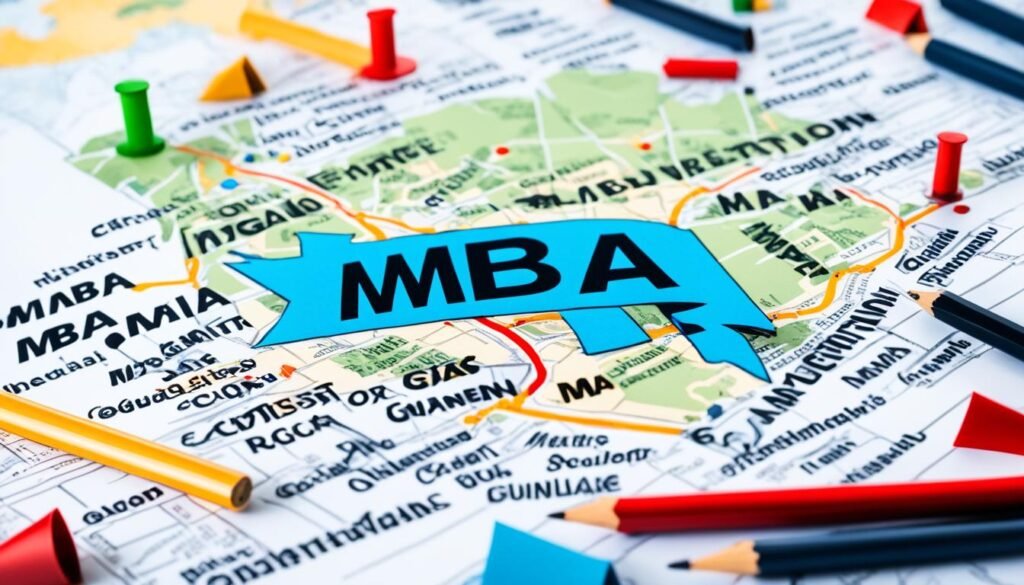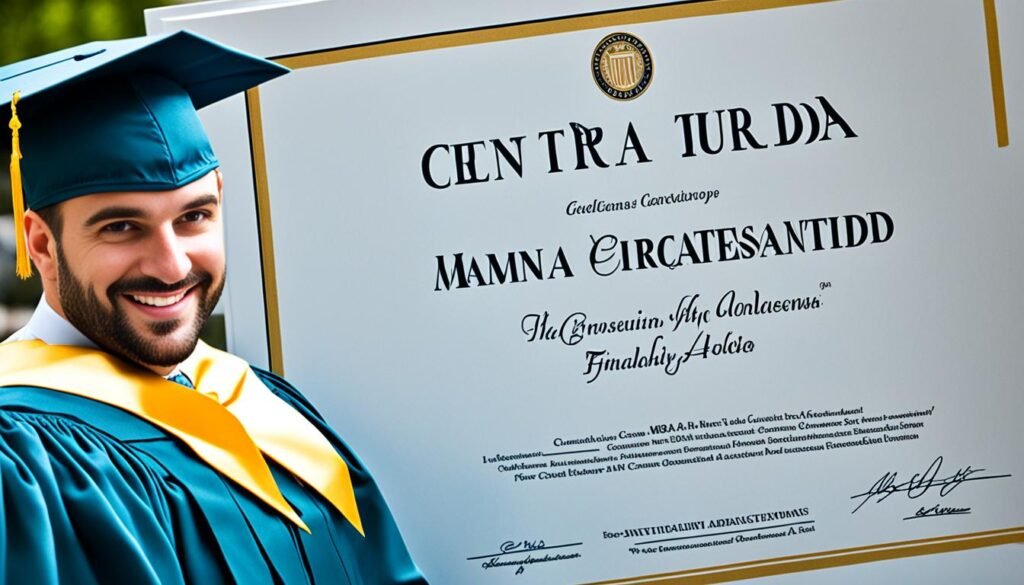Getting an MBA can be expensive, but there are many scholarships to help with the cost. Most business schools have their own scholarships. They also list outside sources to help pay for school. There are many scholarships, fellowships, and grants for MBA students.
Some scholarships are for students all over the country, while others are just for certain colleges. The money you can get varies. A scholarship means you don’t have to pay back the money. This lets you choose more interesting jobs after your MBA.
Key Takeaways
- Universities with business schools often offer in-house MBA scholarships.
- External sources of MBA funding include national scholarships, fellowships, and grants.
- Scholarship opportunities can be college-specific or national in scope.
- MBA scholarships provide financial flexibility and allow students to pursue diverse career paths.
- Researching and applying for MBA scholarships can help reduce the cost of pursuing a graduate business degree.
National MBA Scholarship Sources
Getting an MBA can be expensive, but there are many scholarships available to help. These scholarships are for students who want to pursue an MBA. They come from different sources, including ones for military members and top fellowships.
Military MBA Merit Scholarship
Veterans and active U.S. military members can apply for the Military MBA Merit Scholarship. It’s available at 27 partner schools across the country. To qualify, you need a bachelor’s degree, military service, and leadership experience.
Goldman Sachs MBA Fellowships
First-year MBA students can apply for the Goldman Sachs MBA Fellowship. This scholarship gives $35,000 and a summer job salary. If you finish the internship and get a full-time job, you get another $40,000 and a possible bonus.
Knight-Hennessy Scholars
The Knight-Hennessy Scholars program covers up to three years of study at Stanford University. You must apply for the MBA at Stanford’s Graduate School of Business. Then, you need to apply for the Knight-Hennessy Scholarship separately.
National Black MBA Association
The National Black MBA Association gives scholarships to its U.S. citizen members. Winners go to a partner university. The application details, deadlines, and amounts vary.
College-Specific MBA Scholarships

Looking for funding for your college MBA can open up more chances. Many top universities offer their own scholarships. These can be great for those looking to fund their MBA studies.
Tips for Negotiating MBA Scholarships
Negotiating for a scholarship is a smart move if you have offers from several top schools. Be polite and show how your skills match the university’s goals. Schools use scholarships to draw in the right students.
Some colleges let you apply for scholarships in your first year for the next year. This is a big chance for those wanting more financial help.
“Negotiating for a college MBA scholarship requires a delicate balance of confidence, humility, and a strong profile that aligns with the institution’s priorities.”
Do your homework on the scholarships your universities offer. Then, make a strong case for why you deserve the college MBA scholarship you want.
| University | MBA Scholarship Opportunities |
|---|---|
| Harvard Business School | – Dean’s Scholarship – Leadership Scholarship – Diversity Fellowship |
| Stanford Graduate School of Business | – Knight-Hennessy Scholars – Stanford MBA Fellowship |
| University of Pennsylvania (Wharton) | – Wharton MBA Fellowship – Wharton Leadership Venture Scholarship |
Looking into college-specific scholarships and using smart negotiation tactics can help MBA students get the financial aid they need.
Smaller MBA Scholarships and Their Importance

Financing an MBA program often means looking at big scholarships. But, don’t forget about the smaller ones. These awards may be small, but they can add up and help a lot with the cost of an MBA.
Many smaller MBA scholarships come from business school departments. To apply for these small MBA scholarships, you just need to check a box on your application. It’s important to look into all the scholarships you can find. These smaller awards could be the key to getting the funding you need.
Smaller MBA scholarships focus on your academic achievements. A high test score can boost your chances of getting one. By aiming for these small MBA scholarships, you can get more financial help and lower your tuition costs.
“Smaller scholarships may not seem significant individually, but they can add up to make a real impact on the overall cost of an MBA program. It’s important for students to explore all available options, even the lesser-known ones.”
The importance of MBA scholarships, big or small, is huge. Every scholarship dollar means less money from loans or savings. Using small MBA scholarships can reduce your financial stress. It lets you focus more on your studies and career during your MBA.
In conclusion, don’t underestimate the value of smaller MBA scholarships. These awards, based on your merit, can help make your MBA education more affordable. They can lessen your financial load and make your education more accessible.
MBA Scholarship Application Strategies

Applying for MBA scholarships needs careful planning and focus. Aspiring MBA students must closely follow each scholarship’s rules and deadlines.
Pay Attention to Requirements
Some MBA scholarships have early application deadlines, while others are given out after you’re accepted. It’s key to keep all your documents ready, like essays, letters of recommendation, and transcripts. Missing any document or missing the deadline can lead to not being considered.
Build a Strong MBA Application Profile
A top-notch MBA scholarship application is more than just an essay. Admissions teams want to see top candidates with great GMAT scores, strong undergraduate GPAs, and relevant work experience. Showing your leadership, success, and how you’ll make a difference can boost your scholarship chances.
By focusing on the MBA scholarship requirements and creating a strong MBA application profile, you can set yourself up for MBA scholarship success.
“The whole application, including a good GMAT score, strong undergraduate GPA, and relevant work experience, needs to be strong to increase the chances of receiving a scholarship.”
MBA Scholarship

Getting an MBA scholarship can change your life as a future business leader. While full-tuition scholarships are rare, there are many ways to help pay for your degree. It’s important to look into these options and make your application stand out.
How well you do in your MBA application is key to getting a scholarship. Many schools give out scholarships based on your essays, interviews, grades, and test scores. Showing off your unique skills and leadership abilities can really help you stand out.
To increase your chances of getting an MBA scholarship, follow these tips:
- Look into all the scholarships and fellowships available, both national and specific to colleges. This helps you find the best options for you and your goals.
- Make sure your application fits each scholarship perfectly. Spend time on your essays and show how you’re a great fit for the program.
- Keep your grades up in college and, if you’ve worked before, keep doing well there too. Good grades and scores can really help you in applying for scholarships.
- Get recommendations from teachers, bosses, or mentors who know about your leadership skills, your potential, and your dedication to your studies.
- Apply early and follow all the rules and deadlines to make sure your application is seen.
With a good plan and a strong application, you can boost your chances of getting MBA funding. This can help you reach your goals in education and your career.
“Investing in an MBA can be a big financial step, but with the right scholarships and funding, you can make your dream come true.” – Jane Doe, MBA Admissions Advisor
MBA Scholarships for Minorities
Getting an MBA can change your career and life. But, it’s expensive, especially for minority students. Luckily, there are many scholarships to help them achieve their dreams.
Hispanic and Latino Scholarships
The Hispanic Scholarship Fund (HSF) gives out scholarships to Hispanic students with a 2.5 GPA or higher. The Kosciuszko Foundation also has scholarships for students with Polish roots, including those in business or business administration, with a 3.0 GPA.
African American Scholarships
The Lagrant Foundation gives scholarships to students with a 3.2 GPA or higher. They must be African American/Black, Asian American/Pacific Islander, Hispanic/Latino, or Native American/Alaska Native. They must also study advertising, marketing, or public relations. The National Association of Black Accountants (NABA) offers scholarships to African-American or African descent students.
These MBA scholarships for minorities, like Hispanic MBA scholarships, Latino MBA scholarships, and MBA scholarships for African Americans or Black MBA scholarships, are crucial. They offer financial help and open doors to new opportunities in business for underrepresented groups.
“Investing in the education of underrepresented minorities is not only the right thing to do, but it also benefits society as a whole by cultivating a diverse and talented pool of future business leaders.”
MBA Scholarships for Women
Women often face special challenges when looking for MBA scholarships. But, there are programs that help and support women in getting advanced business degrees. The Forté Fellows Program and the Zonta International Scholarships are two such initiatives.
Forté Fellows Program
The Forté Fellows Program is a top scholarship for women going for full-time MBA degrees at certain schools. Schools pick the winners, looking for strong leadership and a commitment to helping women and girls. This program gives money help and networking chances to the chosen MBA scholarships for women.
Zonta International Scholarships
The Jane M. Klausman Women in Business Scholarship is another big MBA scholarships for women option from Zonta International Foundation. It’s for women of all ages getting a business or business-related degree. The award varies, with $1,000 for U.S. winners and $7,000 for those from other countries.
These programs show how organizations support and empower MBA scholarships for women. They make sure talented women get the resources and chances they need to do well in business.
International Student MBA Scholarships

Getting an MBA as an international student can be expensive. But, there are many scholarships to help. Countries like Spain and Indonesia offer full tuition scholarships to their citizens. These scholarships give a chance for future business leaders to get a top education.
The Thomas R. Pickering Foreign Affairs Fellowship is another great option. It’s for students in a two-year master’s program related to the U.S. Department of State Foreign Service. This award gives up to $37,000 a year. Students must do two summer internships and work in the Foreign Service after graduation. It’s a unique way for international students to start their careers in diplomacy.
- Spain’s La Caixa: Offers full-tuition scholarships for Spanish citizens pursuing an MBA.
- Indonesia’s Endowment Fund for Education: Provides comprehensive scholarships for Indonesian citizens to study MBA programs.
- Thomas R. Pickering Foreign Affairs Fellowship: Grants up to $37,000 annually for international students pursuing a two-year master’s degree related to the U.S. Department of State Foreign Service, with a service commitment upon graduation.
These are just a few examples of international student MBA scholarships out there. They show how governments and organizations support talented students from around the world. By looking into these options, international students can find an MBA scholarship and start a life-changing education journey.
“Investing in the education of international students is a strategic move that benefits not only the individuals but also the global community as a whole.”
Company and Employer Sponsored MBA Funding

Exploring company and employer-sponsored funding options is key for those looking to fund an MBA. Many employers offer help with tuition or reimbursement for employees getting an advanced degree. This can make the cost much lower.
Company sponsored MBA programs are great for working people wanting to grow in their careers and education at the same time. These programs often pay for part or all of tuition. This means employees can get their MBA without spending a lot of money.
To get into these employer sponsored MBA programs, it’s important to check your employer’s benefits and talk to HR about what’s available. Some companies have certain rules or ways to apply. Knowing about these can help you get this great funding.
Using company sponsored MBA and employer sponsored MBA programs lets working people get their MBA without spending a lot. This is a big help for those wanting to move up in their careers and education at the same time.
“Employer-sponsored MBA programs are a win-win for both the employee and the company. The employee gets to advance their education, and the company benefits from having a more skilled and knowledgeable workforce.”
- Look into your employer’s tuition help or reimbursement programs.
- Learn about the steps and any rules for company sponsored MBA or employer sponsored MBA funding.
- Talk to your HR department to see what options you have.
- Think about the perks of an employer sponsored MBA compared to other ways to pay, like scholarships and loans.
By using company sponsored MBA and employer sponsored MBA chances, working folks can find a cheaper way to get an MBA. This can help them move forward in their careers.
Need-Based Financial Aid for MBA Programs

While scholarships and fellowships focus on merit, many need-based financial aid options exist for MBA students. Prospective students should look into grants, loans, and other forms of aid. These can make their MBA education more affordable.
Need-based MBA financial aid includes:
- Federal and state grants, such as the Federal Pell Grant and Federal Supplemental Educational Opportunity Grant (FSEOG)
- Need-based scholarships from the university or college
- Subsidized federal student loans, which do not accrue interest while the student is enrolled
- Work-study programs that allow students to earn money to put towards their education
To apply for need-based MBA financial aid, students must complete the Free Application for Federal Student Aid (FAFSA) form. This form looks at the student’s financial situation. It then calculates the expected family contribution (EFC) towards education costs.
| Type of Need-Based MBA Financial Aid | Description | Eligibility Criteria |
|---|---|---|
| Federal Pell Grant | Need-based grant for undergraduate students with exceptional financial need | Based on the student’s EFC and cost of attendance |
| Federal Supplemental Educational Opportunity Grant (FSEOG) | Need-based grant for undergraduate students with exceptional financial need | Based on the student’s EFC and availability of funds at the school |
| Subsidized Federal Direct Loans | Need-based federal student loans where the government pays the interest while the student is enrolled | Based on the student’s EFC and cost of attendance |
By looking into all need-based MBA financial aid options, students can lessen the financial load of their MBA studies.
Also Read: University Scholarships For USA Students
Conclusion
Getting an MBA can change your life, but the cost can be scary. Luckily, there are many scholarships for MBA students. These scholarships help students reach their goals without huge debt. By looking at different scholarships, from national to college-specific ones, and building a strong application, you can get the funding you need.
If you’re a military veteran, part of a minority group, or an international student, there are scholarships just for you. Also, don’t forget to check out smaller scholarships and see if your employer offers any funding. By carefully going through the application and showing off your skills, you can stand out as a strong candidate for these scholarships.
Getting an MBA is a big step towards your future. With the right financial help, you can open doors to a better career. By using the MBA scholarship resources well, you’re moving closer to your dreams.
FAQs
Q: How do I find scholarship opportunities for MBA students?
A: You can explore various channels such as university websites, scholarship search engines, and financial aid offices for MBA scholarship opportunities.
Q: Are there scholarships specifically for women in business programs?
A: Yes, there are scholarships dedicated to advancing women in business, which are open to female MBA applicants.
Q: What is the application process for merit-based MBA scholarships?
A: The application process typically involves submitting academic transcripts, recommendation letters, a resume, and an essay outlining your achievements and goals.
Q: Can online MBA students also apply for scholarships?
A: Yes, many scholarship programs are open to both full-time on-campus MBA students and online MBA students.
Q: How can I pay for my MBA if I don’t receive a scholarship?
A: You can explore options such as student loans, part-time work, employer sponsorship, or savings to finance your MBA if you do not receive a scholarship.
Q: Are there scholarships offered by specific business schools like Columbia Business School or NYU Stern?
A: Yes, many prestigious business schools offer scholarships to prospective and enrolled MBA students based on merit and financial need.
Q: What types of scholarships are available for two-year MBA programs?
A: There are various scholarships that support students pursuing a two-year MBA, including general merit-based scholarships and those specifically for women or minority groups.
Source Links
- https://www.usnews.com/education/best-graduate-schools/paying/articles/mba-scholarships-that-can-help-pay-for-business-school
- https://www.accreditedschoolsonline.org/business/mba/scholarships/
- https://www.usnews.com/education/best-graduate-schools/top-business-schools/articles/how-to-get-a-low-cost-or-free-mba




